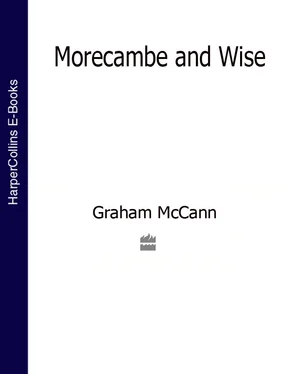The Morecambe & Wise Show had an identity: it was not just some show that just happened to be transmitted by the BBC 6– it was a bona fide BBC show, the kind of show that the BBC, when it has a mind to, can and does do best. Judicious, well crafted and characterful, The Morecambe & Wise Show made viewers feel pampered rather than patronised. Whether it was the sight of the set for the Singin’ in the Rain routine that mirrored the MGM original down to the last detail (except, of course, for the rain), or the full orchestra that sat patiently in silence while ‘Mr Preview’ tried in vain to extend the introduction to Grieg’s Piano Concerto by ‘about a yard’, or the exquisite timing of Eric’s laconic reaction to the fleeting sound of a passing police car’s siren (‘He’s not going to sell much ice-cream going at that speed’), one always knew that every single element had been tried and triple-tested before being allowed on to the screen. This was a show, in short, that worked hard to please its public; this was a show that cared.
Neither Morecambe nor Wise ever looked down on, or up at, anyone (except, of course, each other); both of them looked straight back at their audience on level terms. No celebrated guest was ever allowed to challenge this comic democracy: within the confines of the show, the rich and the famous went unrecognised and frequently unpaid (a running gag in that 1977 Christmas special had Elton John wander awkwardly and anonymously along the begrimed and labyrinthine corridors of Television Centre in search of the right studio – ELTON: ‘I’ve been all over the place.’ ERIC: ‘In that suit?’); venerable actors with grand theatrical reputations were greeted routinely by Eric’s sotto voce alert to Ernie: ‘Don’t look now. A drunk’s just come on. To your right. A drunk. I’ll get rid of him’; a stray patrician mien was mocked (as, indeed, was any word like ‘mien’) by a pointedly plebian comeuppance (the very posh Penelope Keith was obliged to cut short her near-regal entrance, hitch up her dress, clamber down from an unfinished staircase and hobble angrily off the stage); the starchy sobriety of the professionally serious was spirited swiftly away by elaborately pixillated concoctions (an unlikely troupe of newsreaders, sports presenters and critics, all dressed up in crisp white sailor suits, were pictured performing some joyously improbable somersaults, handsprings and cartwheels while singing ‘There’s Nothing Like a Dame’ from South Pacific ); and two resolutely down-to-earth working-class comedians from the North of England gleefully reaffirmed the remarkably deep, warm and sure relationship that existed between themselves and the British public.
‘It was’, reminisced Ernie Wise, ‘a sort of great big office party for the whole country, a bit of fun people could understand.’ 7From the first few seconds of their opening comic routine to the final few notes and motions of their closing song and dance, Morecambe and Wise did their very best to draw people together rather than drive them apart. Instead of pandering submissively to the smug exclusivity of the cognoscenti (they were flattered when a well-regarded critic praised the sly ‘oeillade’ that accompanied Eric’s sarcastic asides, but they still mocked him mercilessly for the literary conceit 8), and instead of settling – as so many of their supposed successors would do with such unseemly haste – for the easy security of a ‘cult following’ (‘Can we say “cult”?’ Eric would have inquired anxiously of someone lurking in the wings), Morecambe and Wise always aimed to entertain the whole nation.
It happened one night, but it had taken years to realise. The seventies were the great years of Morecambe and Wise, the ‘golden years’ when they came to be regarded as national treasures – admired in the quality press as ‘the most accomplished performing artists at present active in this country’, 9applauded in the tabloids as ‘the people’s choice’, 10and asked by the Queen Mother to teach her their trusty ‘paper bag trick’ 11– but this exalted status had only been won after some thirty years of hard work in front of hard audiences, making mistakes, trying out new tricks, mastering old ones, refining their technique, sharpening their wits and, slowly but surely, evolving a style that was entirely their own. By the start of the seventies, therefore, Morecambe and Wise were more than ready for their close-up, and, when it came, they made sure that they made the most of it.
When viewers watched that final show at the end of 1977, they witnessed a rare and rich compendium of the very best in popular culture: the happy summation of a joint career that had traversed all of the key developments associated with the rise of mass entertainment in Britain, encompassing the faint but still discernible traces of Victorian music-hall, the crowded animation of Edwardian Variety, the wordy populism of the wireless, the spectacular impact of the movies and, finally, the more intimate pervasiveness of television. When it was all over, it was sorely missed.
Eric Morecambe died in 1984 and Ernie Wise in 1999, 12and on each of these sad occasions it felt to many as if they had lost an old and precious friend rather than merely a vividly endearing entertainer. The shows, however, remain, and the shows continue to matter. In November 1996, at the ceremony that marked the sixtieth anniversary of BBC TV, it was announced to no one’s great surprise that viewers had voted Morecambe and Wise the all-time Best Light Entertainment Performers, and The Morecambe & Wise Show the all-time Best Light Entertainment Series, and, in September 1998, the readers of the Radio Times voted the programme the all-time Best Comedy Show. Excellence never dates: even now, so many years after that last great night, millions of viewers still settle down to watch the old repeats, and to be entertained all over again by a rather tall man called Eric and a rather short man called Ernie. They were simply irreplaceable.
We are two people with one background between us.
ERNIE WISE
CHAPTER I
Northern Songs and Dances
We’ve always considered ourselves sophisticated Northerners.
ERIC MORECAMBE
Music-hall … was professional, and our early ambition was always to become professional.
ERNIE WISE
Morecambe and Wise 1were made in the North of England. Their North of England, as far as their television conversations were concerned, was squeezed into a surreal and nameless little town that somehow managed to straddle the Pennines, a timeless place where clog dancing and cloth caps were forever to be found in fashion, and where all events of any real significance took place at one or other of five peculiar locations: the very modest working-class home of the Morecambe family, the rather grander working-class home of the Wise family, the somewhat insalubrious Milverton Street School, the long, dense and exotic Tarryassan Street or the compact but endlessly fascinating strip of land over which Ada Bailey would hang out her knickers to dry. Their North of England, in reality, was the materially impoverished but culturally rich North of England of the twenties and thirties, an area that stretched more freely over Lancashire, Yorkshire and a small but significant portion of Northumberland.
Eric Morecambe was a Lancastrian. One only had to hear his memorable voice utter a phrase like, ‘I’ll tell you for why …’, or invite a distinguished politician to ‘sit down and take the weight off your manifestoes’, or respond to a sudden show of affection from a male friend by shouting, ‘ Geddoff! Smash your face in!’, or greet the inexplicable with an exclamation that slipped out from under a sigh, ‘Hhahh-there’s no answer to that!’, to appreciate the effectiveness of that warmly authoritative Lancastrian accent. It was J. B. Priestley who, during his English Journey of the early thirties, remarked on the fact that the ‘rather flat but broad-vowelled speech’ of the Lancastrian had come to be regarded as ‘almost the official accent of music-hall humour’ 2– and that, coming from a Yorkshireman, was quite an admission.
Читать дальше











![Brian Thompson - A Monkey Among Crocodiles - The Life, Loves and Lawsuits of Mrs Georgina Weldon – a disastrous Victorian [Text only]](/books/704922/brian-thompson-a-monkey-among-crocodiles-the-life-thumb.webp)
